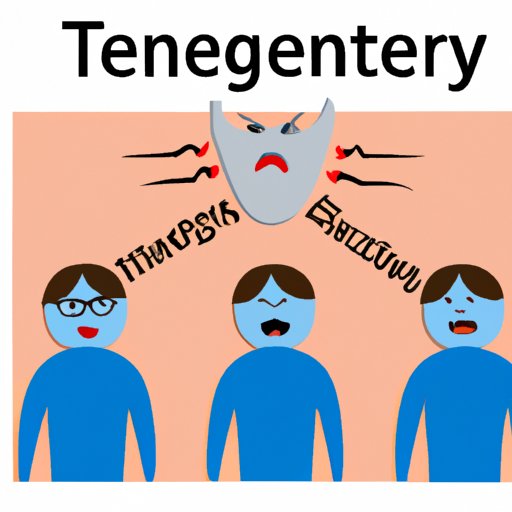Introduction
Jealousy is a complex emotion that can range from a mild feeling of insecurity to an intense feeling of possessiveness or suspicion. While it’s a natural emotion that everyone experiences from time to time, it can become problematic when it takes over one’s life and leads to unhealthy behaviors. This article will explore the pros and cons of jealousy, examine its role in relationships, and investigate whether it can lead to positive outcomes.

Examining the Emotional Effects of Jealousy
In order to understand the impact of jealousy on our lives, it’s important to first look at the emotions associated with it. Jealousy can cause a range of negative emotions, including anxiety, anger, sadness, and fear. These feelings can be overwhelming and can interfere with our ability to think clearly and act rationally. It’s also important to note that these emotions can be contagious, leading to tension and conflict in relationships.
When it comes to mental health, jealousy can have a serious impact. It can lead to anxiety and depression, as well as low self-esteem. It can also cause us to become overly controlling or possessive in our relationships, which can lead to further problems. In extreme cases, it can even lead to violence or abuse.
Analyzing the Pros and Cons of Jealousy
When it comes to the pros and cons of jealousy, there are both benefits and drawbacks. On the one hand, feeling jealous can be a sign that we care deeply about someone and want to protect them. It can also motivate us to take action and make changes in our lives if we feel that something isn’t right. On the other hand, feeling jealous too often can lead to unhealthy behaviors, such as obsessing over someone, attempting to control them, or becoming overly suspicious.
Jealousy can also lead to feelings of insecurity and inadequacy, which can be damaging to our self-esteem and relationships. If left unchecked, it can cause a lot of pain and suffering for both parties involved. It’s important to recognize when jealousy is getting out of hand and take steps to address it.

Investigating Whether Jealousy Can Lead to Positive Outcomes
Although jealousy can cause a lot of pain, it doesn’t always have to be a negative experience. In fact, it can be used as a tool for growth if we are able to manage it effectively. For example, feeling jealous can be a sign that we need to focus on ourselves and work on improving our own self-confidence. It can also be a reminder to focus on building strong, healthy relationships and setting appropriate boundaries.
It’s important to remember that jealousy is a normal emotion and doesn’t have to be viewed as a weakness. With the right tools and strategies, it can be used as a catalyst for personal growth and development.
Exploring the Role of Jealousy in Relationships
Jealousy can have a huge impact on relationships, both romantic and platonic. It can cause tension and mistrust, leading to arguments and hurt feelings. It can also lead to controlling behavior and possessiveness, which can be damaging to any relationship. On the other hand, feeling jealous can also be a sign that we care deeply about someone and want to protect them.
The key is to learn how to manage jealous feelings in a healthy way. Communication is key, so it’s important to talk openly and honestly about your feelings with your partner. It’s also important to set clear boundaries and stick to them. Finally, it’s important to practice self-care, as this can help you to stay grounded and maintain perspective.

Investigating Causes of Jealousy
In order to effectively manage jealous feelings, it’s important to identify the underlying causes. Common triggers include feelings of insecurity or inadequacy, fear of abandonment, or past trauma. It’s also important to recognize the signs of jealousy, such as intrusive thoughts, irrational behavior, or obsessive behaviors.
Once you’ve identified the cause of your jealousy, it’s important to take steps to address it. This may involve talking to a therapist, journaling, or engaging in activities that make you feel more secure and confident. It’s also important to practice self-compassion and remind yourself that you’re not alone in feeling jealous.
Looking at How to Handle Jealousy Constructively
The key to handling jealousy constructively is to recognize it for what it is and take steps to manage it in a healthy way. This may involve talking to a trusted friend or family member, practicing mindfulness, or engaging in activities that make you feel more confident and secure. It’s also important to remember that jealousy is a normal emotion and doesn’t have to be viewed as a weakness.
Finally, it’s important to remember that no one is perfect and that it’s OK to make mistakes. The key is to forgive yourself, learn from your mistakes, and move forward. With the right tools and strategies, it is possible to use jealousy as a tool for growth and development.
Conclusion
In conclusion, jealousy is a complex emotion that can range from a mild feeling of insecurity to an intense feeling of possessiveness or suspicion. It can have both positive and negative effects, and it’s important to recognize when it is getting out of hand and take steps to address it. It’s also important to remember that jealousy is a normal emotion and can be used as a tool for growth if managed effectively.
By understanding the emotions associated with jealousy, examining the pros and cons, exploring the role of jealousy in relationships, and investigating causes and constructive ways to handle it, we can better understand this complex emotion and use it to our advantage.
(Note: Is this article not meeting your expectations? Do you have knowledge or insights to share? Unlock new opportunities and expand your reach by joining our authors team. Click Registration to join us and share your expertise with our readers.)
